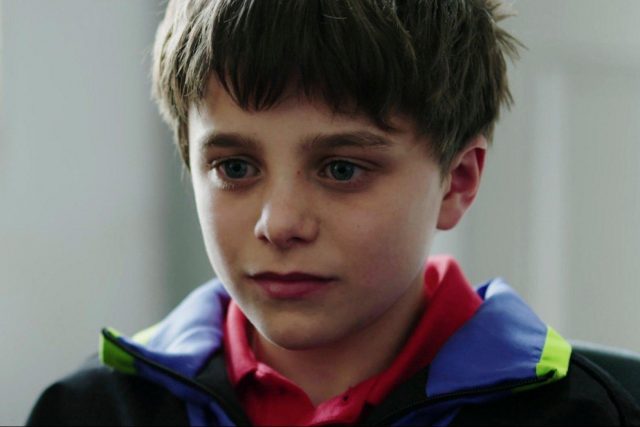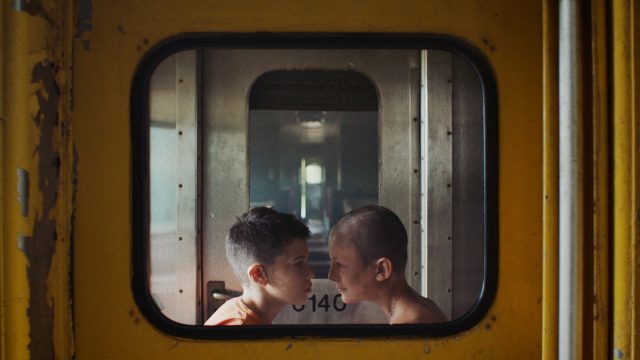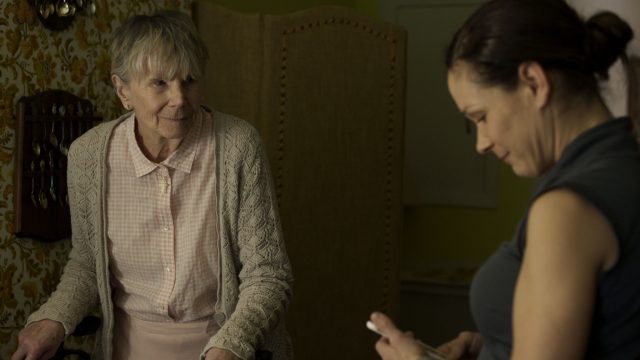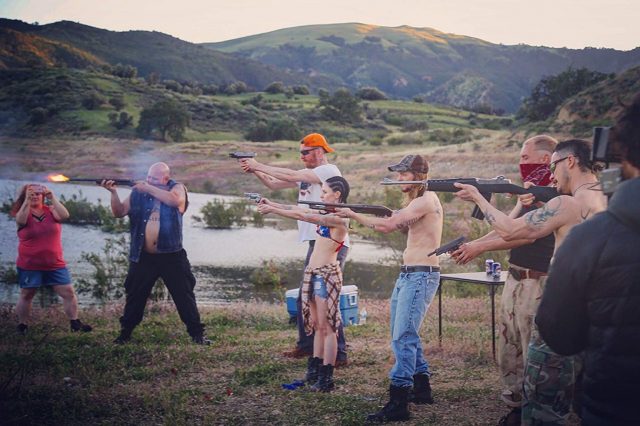The 2019 Oscar-Nominated Live-Action Shorts: Innocence and Ugliness, by Craig Schroeder

Detainment
If “Detainment” is any indication, this year’s crop of Oscar nominated short films are going to be a brutal entree of nastiness and despair. “Detainment,” based on the true story of a 1993 case from Liverpool in which a two year old toddler was abducted, tortured, mutilated, and killed by two ten year old boys who then left his body on railroad tracks to be mangled by an unaware train—is a hideous story that adapts hours of police interrogation into a grim, excruciating thirty minute film (the longest of this year’s nominees). The suspects, ten year olds Jon (Ely Sloan) and Rob (Leon Hughes), provide sometimes conflicting but always agonizing accounts of the murder.
“Detainment” is a difficult film to review. While it may merit some technical praise, it is such an unpleasant viewing experience that little else comes to mind. The majority of the film takes place inside the police interrogation rooms with frequent (and often superfluous) quick cuts that add visuals to what the boys are describing. Writer and director Vincent Lambe, perhaps too slavishly devoted to the lurid confession tapes, turns in a film with stiff dialogue that is preoccupied with obsequious recreation. This spiritless adherence raises the question: What’s the point? A small child is dead and two others have lost any semblance of their childhood innocence (this theme is explored much better in one of this year’s other nominees) but Lambe seems uninterested in any subtext that distracts from the nausea-inducing nastiness of the case as a whole. “Detainment” is neither the best nor the worst film to be nominated this year for the live action shorts. But it’s certainly the most unpleasant.

Fauve
There’s so much to process in “Fauve”’s short sixteen minute run time (the shortest of this year’s nominees). Two young boys in Quebec, aimless and bored, make fun and adventure wherever they can, in abandoned train cars, in hollowed out factory buildings, and in dangerous mine quarries, trying their best to act as children do, until the world itself (quite literally) swallows them whole. “Fauve” is a gut-wrenching meditation on the loss of innocence and the purity of childhood friendship.
“Fauve”—in French, the title translates to “wild beasts”—is the best selection of this year’s live action short films and has already amassed a collection of awards and accolades. Director Jeremy Comte has an uncanny eye for storytelling with nearly static images. “Fauve”’s opening is a long shot looking down the aisle of a deserted train car. A muffled voice rambles incoherently from an unseen location until a child appears. In a few simple, wordless frames, Comte—with the help of cinematographer Olivier Gossot, whose work behind the camera turns junk heaps, busted windows, and the swirl of pale dirt into some of the year’s best photography—conveys time, place, and tone with economic precision.
But “Fauve” belongs to Felix Grenier, the pre-teen actor who delivers a performance roiling with emotional intelligence and nuance. Grenier—his co-star Alexandre Perreault is also fantastic but doesn’t carry the brunt of the film’s pathos like Grenier—transforms his character from an insouciant child to a world weary cynic with just a gradient change in comportment and body language. Though I have an awful track record of guessing the Academy’s proclivities, “Fauve” is undeniably the best of the Academy’s 2019 nominated live action short films and would be my selection as the odds on favorite come February 24th.

Mother
“Mother” is a fascinating film that just doesn’t work for me. A twenty minute film shot almost entirely in a single take, Marta (played wonderfully by Marta Nieto) is in her home with her mother on a quiet afternoon when she receives a phone call from her small child telling her he’s miles away, alone, and in trouble. The film follows Marta through her apartment as her initial concern evolves into panic and terror.
From a technical perspective, “Mother” is a marvel. Though shot in a single location, the film’s camera and its actors (in addition to Nieto, Blanca Apilánez appears as Marta’s mother) are kinetic and move with excitement and intent, snaking through the halls of Marta’s apartment and adjusting focus with fluidity and ease. It’s dazzling to see director Rodrigo Sorogoyen make what is essentially a long phone call into a lean chunk of thrilling filmmaking. However, the screenplay just doesn’t land the same way. By the film’s nature, the character arcs are lopsided, and the unseen character on the other end of the phone (voiced by Álvaro Balas) becomes just a device, pulling back the curtain and exposing the machinations of the screenplay, removing the tension the technical filmmaking builds.

Marguerite
This year’s Oscar nominated live action shorts are mostly assertive and clamorous, presenting their themes with little subtlety (for better or for worse). “Marguerite,” one of the best of this year’s nominees, is slightly more clandestine in its approach, allowing the audience to live with its characters a bit before revealing itself. The title character is an elderly woman, living alone in her home, accompanied only by the daily visits of her caretaker Rachel, a younger woman who bathes her, feeds her, and tends to her aging mind and body. When an innocuous comment affords a peek into Rachel’s personal life, Marguerite is confronted by regret, pain, and a life she may have had in another time or place.
Like “Fauve,” “Marguerite” is a beautifully made film outpaced only by the distinction of its lead performances. Not much is known about Marguerite or Rachel aside from the pleasantries they share in their respective roles as patient and caretaker. But when a repressed commonality is revealed, both women find themselves wordlessly confessing intimate details with just the flick of an eye or a prolonged touch. The actors—Beatrice Picard as Marguerite and Sandrine Bisson as Rachel—take writer/director Marianne Farley’s spartan script and punctuate all of the quiet moments with silent screams of empathy and regret. Picard and Bisson have chemistry that feels both distant and intimate, like the alien comfort of walking into an apartment you once lived in only to see it decorated with some else’s life and experience. “Marguerite” is an austere story, told with captivating complexity.

Skin
The road to an Oscar win is paved with noble intentions. And the most I can say for director Guy Nattiv’s “Skin” is that it does have noble intent. However, “Skin”’s half-baked, ill-conceived take on racial animus is juvenile, retrograde, and gleefully unaware of its own shortcomings.
“Skin” tells the story of a neo-nazi and his impressionable pre-pubescent son, whose only worldview is informed by shirtless, hate-spewing fascists. While it makes sense to ask the viewer to sympathize with the young boy (played quite well by Jackson Robert Scott)—a true innocent unwittingly poisoned by hate—the film asks the viewer to extend that same empathy towards the father in the misguided notion that there’s something to learn from racist scum. And while the film spends an inordinate amount of time humanizing a nazi, it offers no similar attempt to humanize the marginalized groups affected by the main character’s bigotry. In an effort to tell an affecting story about racism, “Skin” misses the mark entirely, reducing its black characters to bit parts and plot devices, employing one of Hollywood’s most regressive (but often used) motifs: using black bodies as nothing more than monolithic props for stories about hideous white people.
“Skin” is far from the first film (this year, even) with an utterly bullheaded script about racism but it’s the film’s third act “twist” that truly perverts its thesis and obscures any actual point it may have been working towards and morphs the entire thing into an impolitic disaster. After Johnny—the aforementioned nazi scum—nearly beats a black man to death for speaking to his son, the story takes a hard right turn that makes every wrong decision in its attempt to—Twilight Zone style—balance shock with poetic injustice. After asking the audience to sympathize with the racist lead character, the film ultimately makes him somewhat of a martyr while also turning the black characters into the film’s de facto villains. It’s an impulse that prioritizes “OH, SHIT!” moments without actually thinking about the implications of what is being put on screen.
“Skin” is what would happen if Get Out were told from the perspective of the white characters. It’s so tactless and facile it ultimately feels more like a Nathan For You prank satirizing the Academy’s tendency to fetishize black pain for white stories.


























